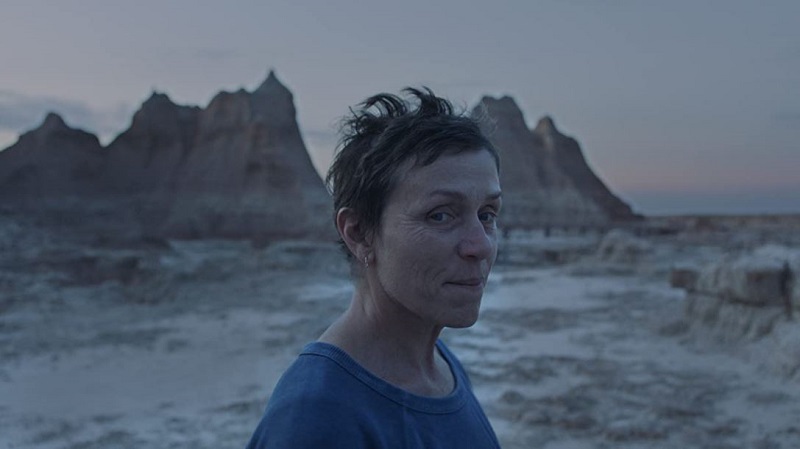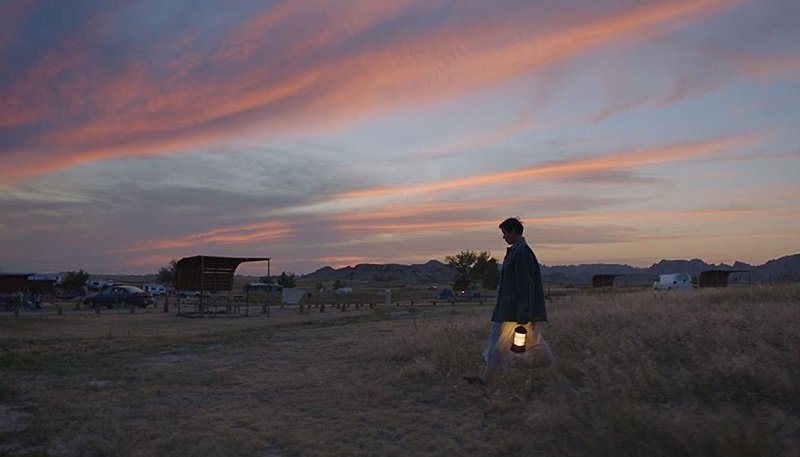The road trip movie is a subgenre that has enthralled audiences for decades and Nomadland—starring Frances McDormand—takes it to a whole different level.

McDormand stars as Fern, a widow who hit the road in her van/home when her town of Empire, Nevada was literally wiped off the map, thanks to the Great Recession of 2008. Seriously, the Postal Service actually deleted the zip code assigned to the Silver State locale. The bustling town came to a screeching halt when the enormous mill in town closed down and sources of income vanished.
Fern still wears her wedding ring, missing her husband desperately. It doesn’t fill the void, but the friendships she fosters as she crosses the country is one of a shared passion for the road less traveled.
Her contentment with living this Nomadland lifestyle is crystal clear. She is not homeless. Her home is her van. She gets by on seasonal jobs (such as Amazon at Christmas time) and lives in RV parks or places where it’s legal to park (i.e., sleep) overnight. As embodied by McDormand, Fern cannot think of living life in any other manner. There’s even a point where she is offered a room in someone’s guest house. In the next scene, she’s behind the wheel!
Director Chloé Zhao (who also adapted the Jessica Bruder book) has quite an achievement on her hands. Of course, simply pointing the camera at McDormand and letting her showcase her gifts would be enough to have any film triumph. But with Nomadland, Zhao and her team have crafted a landscape that is reeling from the Great Recession of 2008, but these folks could be the economic casualties of the pandemic in 2020.
It’s one of those films that sits with you, long after the credits roll. Following Fern around the western part of the United States is a lesson in fortitude, the evolving definitions of “family,” and not simply making the most of a bad situation. Instead, it’s embracing a lifestyle.
Heck, there’s even a Nomadland “leader” who produces YouTube videos that chronicle the living on the road lifestyle. Nomadic guru Bob Wells (who plays himself) is just one of several real-life livers of this way of life that inhabit Zhao’s triumph. We meet him at several of Fern’s stops, along with Gay DeForest, Patty Grier, Linda May—all “Nomads” who live in their van due to economic hardship or simply deciding one day to sell the house and most of the belongings in an effort to streamline life.
Now, most of these folks… this life is a necessity, due to economics. What provides the “suspense” in Nomadland is how Zhao paints a portrait of a woman in Fern who is as self-sufficient as one can be yet is one trip to the mechanic from being homeless. That is a common stressful thread that permeates the film, and it hits close to home because so many of us, particularly now with the pandemic, is one disastrous need away from living on the streets ourselves.
The most fascinating aspect of Zhao’s film is how not much occurs, and that’s just fine. This is firmly a slice of life film that exposes the viewer to a microcosm world that few probably even knew existed. Within that realm of the story is something touching. These folks are akin to family. They may not see each other for months, years even. But as they traipse from RV park to Walmart parking lot, you see folks you know.

Beyond the financial need to live this life, countless souls we meet throughout the film are not only content with this lifestyle, but they also embrace it with both arms and give it a bear hug. America is a gorgeous country, particularly the western half. Sure, it’s difficult. Showers, cooking… these are all things that these folks got down to a science. It’s not for the faint of heart, but it is portrayed as a version of heaven for those living it.
The cinematography, by Joshua James Richards, and the score, by Ludovico Einaudi, join forces to provide layers of color, literally and figuratively. It is a rich panorama that we live in for the film’s running time. The music by Einaudi overwhelms us with a peaceful easy feeling while Richards’ lens puts the viewer in the driver’s seat as vans and RVs go from place to place.
McDormand is a revelation. The entire movie rests on her shoulders and it should surprise nobody that she digs in and delivers one of the best performances in her career. There’s a raw reality that she brings to the role, and thus the film as a whole, that makes Nomadland’s way of life pricelessly palpable. What the actress is able to achieve with so little is simply incredible. She has the most expressive face and puts it to work in every single frame. There is an emotive tether between Fern and the viewer that is incredibly moving.
The Oscar winner (for Misery and Three Billboards) will easily hear her name called when nominations are announced in the earlier part of 2021. This is one of those parts and movies where it is impossible to think of anyone else inhabiting Fern and being able to do what she does with our emotions.
Back in 2017, Zhao gave film fans a gift with The Rider. That too was a slice of life story that followed the effect that caring for animals had on prisoners. The filmmaker is clearly drawn to stories that focus on a segment of the populations that are underrepresented and we look forward to whatever or whoever she points her camera at next.
Grade: A+

